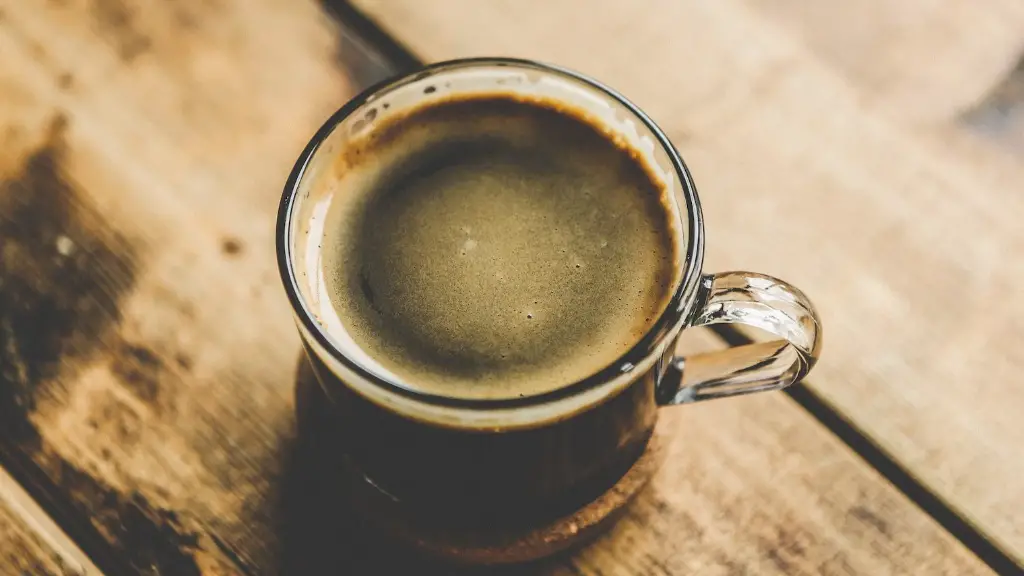Do you find yourself struggling to concentrate when you drink coffee? Or worse, does your head start to hurt after only a few sips? Caffeine, one of the main ingredients in coffee, can increase alertness and concentration. But if you’re drinking too much coffee, you may be overloading on caffeine, killing some of its beneficial effects and leading to a lot of stress on your brain.
Caffeine impacts the body in several ways, and can be disruptive if ingested in large amounts. When you have a cup of coffee, the caffeine enters your bloodstream, where it binds to certain receptors in the brain. This makes it hard for other hormones to do their job – hormones like dopamine, which helps us feel pleasure, and serotonin, which helps us to be calm or relaxed. When these important hormones are disrupted, a person can become anxious and may even experience headaches or migraines, especially if they are drinking more than one cup of coffee in a short period of time.
It isn’t just coffee that can be the problem. Caffeinated energy drinks, soft drinks, and chocolate also contain caffeine and can produce the same effects on your body – dizziness, headaches, and increased heart rate. But unlike some of these other sources, coffee causes more sustained changes in the body. The caffeine from coffee is released more slowly, so it can take hours for the effects to wear off. This is why headaches can occur after longer periods of drinking coffee.
Coffee affects everyone differently and it is important to consider your own individual tolerance. It is recommended that adults consume no more than 400mg of caffeine a day – equivalent to around 4 cups of coffee per day. If you feel a headache coming on after drinking coffee, it’s a good idea to cut back or to switch to decaf. You can also try adding milk or cream to your coffee to help reduce the effects of the caffeine.
It’s also important to remember that headaches can be caused by other things than caffeine. If you’re consistently experiencing headaches after drinking coffee, it may be a good idea to talk to your doctor. Your doctor can help you determine the cause of your headaches and recommend treatment options.
Caffeine withdrawal
If you regularly consume caffeine and then stop cold turkey, it is possible to feel the effects of caffeine withdrawal. This can include headaches, fatigue and irritability. Because of this, it is important to cut down slowly if you are trying to cut out caffeine from your diet, rather than stopping all at once.
It’s also important to stay hydrated when weaning off caffeine, as dehydration can cause headaches or migraines. If you are drinking coffee in the morning, try to drink water throughout the day to stay hydrated. Dehydration can be especially problematic when combined with coffee, as the diuretic effects of coffee can cause you to lose more water than normal.
Remember that it takes time to get used to a new lifestyle without coffee. Make sure that you have other sources of energy – like a healthy diet, exercise or even just a nap – to get through the day. And don’t forget to also give yourself time to relax and de-stress. Knowing when to take a break can make all the difference in reducing headaches or feelings of sluggishness.
Improve Your Sleep Quality
When drinking coffee throughout the day, it can be easy to forget how it can affect our sleep patterns. Caffeine can stay in the body for up to 6 to 8 hours, meaning that if you drink coffee late in the day it can disrupt your sleep. This can further lead to more headaches and further trouble concentrating when you do wake up.
It is important to be aware of when you are consuming caffeine and how you are reacting to it. A good way to make sure you maintain good sleep is to limit the number of cups of coffee you have a day and to avoid drinking it after lunch. You should also keep track of any other sources of caffeine you may be having, such as energy drinks or chocolate. Limiting your caffeine intake late in the day can also help to improve your sleep quality.
In addition to limiting your caffeine intake it’s important that you practice good sleep hygiene. Setting a regular sleep schedule, avoiding screens before bed and making sure that your bedroom is dark and quiet can help you get better quality sleep. Quality sleep is important for maintaining good overall health and reducing headaches.
Relaxation Exercises
Relaxation exercises, such as mindfulness and deep breathing, can be beneficial for reducing stress on the body and the mind. Not only can these exercises help reduce headaches and migraines, they can also help to improve overall mental health and well-being.
When faced with a headache, it is important to take a moment and relax. Take a few deep breaths and focus on each one as it enters and leaves your body. Allow any intrusive thoughts to simply pass. If you need help focusing on your breathing, try some guided breathing exercises or listen to calming music.
If you are feeling stressed, there are also simple exercises you can do to help reduce stress. Some of these may include yoga, meditation, or progressive muscle relaxation. These activities can be done quickly, even when you’re on the go.
Finally, it can also be helpful to simply take a break from things. Log out of your computer, turn off your phone, and take some time away from things. This can help to clear your mind and provide some much needed time to rest and relax.
Calming Strategies
It is important to find calming strategies that work best for you. Different activities or environments can help to relax the mind and body. Some people may find serene environments such as nature walks or dimly lit rooms to be helpful. Others can find comfort in physical activities or even listening to music.
Try to incorporate some of these calming strategies into your daily routine, even if it’s just for a few minutes. This can help to reduce stress and tension, leaving you feeling more relaxed and centered.
Some people may find meditation or yoga to be useful for calming the mind, while others prefer to take a quick walk or engage in physical activity. Experiment with different activities to find what works for you and incorporate these activities into your daily routine, to help reduce headaches or migraines.
Conclusion
Headaches after drinking coffee can be a bothersome, but understanding the cause can help you figure out how to reduce the occurrence or even prevent them altogether. It is important to be aware of your individual caffeine tolerance and to experiment with different strategies, such as drinking coffee in moderation and incorporating relaxation exercises into your daily routine. Once you find what works best for you, you can reduce headaches or other negative effects.




